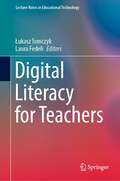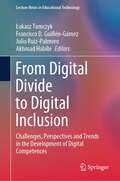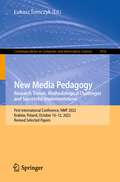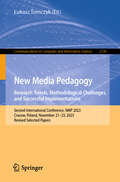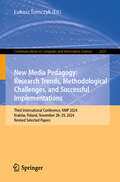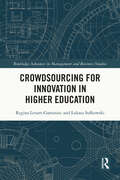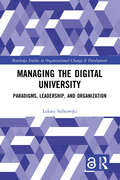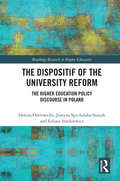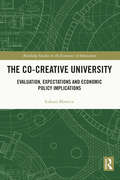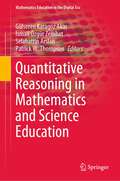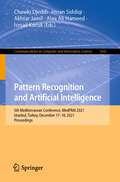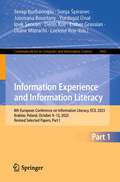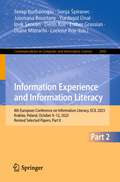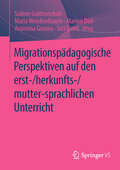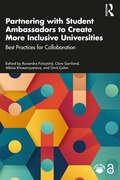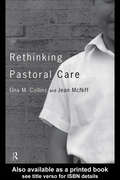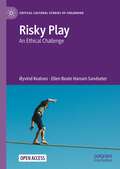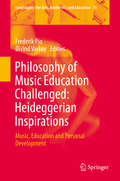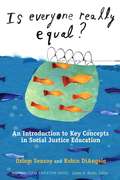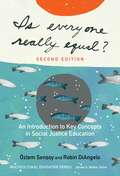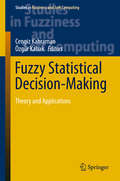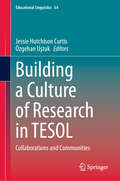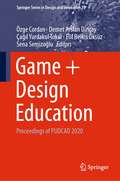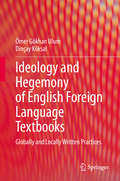- Table View
- List View
Digital Literacy for Teachers (Lecture Notes in Educational Technology)
by Łukasz Tomczyk Laura FedeliThis book shows the results of research in different countries on how to measure digital competence among future generations of teachers and facing the challenges brought by the convergence of analogue and digital media. This book provides answers to the research questions: How should the key competencies related to media pedagogy be effectively measured and compared? What is the level of digital literacy of pre-service teachers in selected countries? The individual chapters are based on a systematic review of research results (from the last two decades) to show trends related to changes in measurement and levels of digital competence. This book is valuable for researchers training future generations of teachers in the use of new media as well as to those trying to measure the development of the information society, as well as those conducting research in the field of comparative pedagogy (including the transfer of the most effective solutions in the field of media pedagogy).
From Digital Divide to Digital Inclusion: Challenges, Perspectives and Trends in the Development of Digital Competences (Lecture Notes in Educational Technology)
by Łukasz Tomczyk Francisco D. Guillén-Gámez Julio Ruiz-Palmero Akhmad HabibiThis book offers an expert perspective on two key phenomena in the development of the information society, namely digital inclusion and digital exclusion. Despite the intensive digitalization of various areas in human activity, the lack of proper information and communications technology (ICT) literacy, the lack of access to high-speed Internet, and the still unsatisfactory level of e-services are a reality in many regions and countries. This edited book presents a unique overview of research related to the dynamics of digital exclusion and the development of digital competences, as well as an analysis of the most effective educational solutions to foster the digital inclusion of disadvantaged groups. This book is particularly useful for educators dealing with the topic of digital exclusion and inclusion and who are looking for knowledge on enhancing digital competences in disadvantaged groups. It is also helpful for social policy makers involved in designing solutions to minimize various forms of digital exclusion. Finally, this book serves as a reference for academics and students from the disciplines of pedagogy, social policy, new media psychology, media sociology, and cultural anthropology.
New Media Pedagogy: First International Conference, NMP 2022, Kraków, Poland, October 10–12, 2022, Revised Selected Papers (Communications in Computer and Information Science #1916)
by Łukasz TomczykThis volume constitutes selected papers presented during the First International Conference on New Media Pedagogy: Research Trends, Methodological Challenges and Successful Implementations, NMP 2022, held in Kraków, Poland, in October 2022. The 20 papers presented were thoroughly reviewed and selected from the 55 qualified submissions. They present recent research in the areas of teacher education in the information society, digitally-enhanced didactics, pedagogical innovations using ICT, e-learning, blended learning, crisis e-learning, digital inclusion and exclusion, identity of media pedagogy, and more.
New Media Pedagogy: Second International Conference, NMP 2023, Cracow, Poland, November 21–23, 2023, Revised Selected Papers (Communications in Computer and Information Science #2130)
by Łukasz TomczykThis volume constitutes selected papers presented during the Second International Conference on New Media Pedagogy: Research Trends, Methodological Challenges, and Successful Implementations, NMP 2023, held in Cracow, Poland, in November 2023. The 29 papers presented were reviewed and selected from 90 submissions. They focus on recent research and emerging concerns in the field of media pedagogy, such as determinants of teachers' functioning in computerised schools, digitally assisted didactics, ICT-based solutions for teaching support, e-learning during crisis, digital inclusion and exclusion, Artificial intelligence in education and more.
New Media Pedagogy: Third International Conference, NMP 2024, Kraków, Poland, November 28–29, 2024, Revised Selected Papers (Communications in Computer and Information Science #2537)
by Łukasz TomczykThis volume constitutes the revised selected papers of 3rd International Conference on New Media Pedagogy, NMP 2024, in Kraków, Poland, during November 28–29, 2024. The 23 full papers included in this book were carefully reviewed and selected from 72 submissions. They were organized in topical sections as follows: Innovative ICT applications in education; AI in education.
Crowdsourcing for Innovation in Higher Education (Routledge Advances in Management and Business Studies)
by Łukasz Sułkowski Regina Lenart-GansiniecSignificant disruption to the educational sector occurred due to the COVID-19 pandemic. This shed a light on the need for new delivery methods and greater collaboration, which has become urgent and obvious as existing structures and traditional channels have struggled to cope or shut down. Higher education institutions often fail to crowdsource successfully because crowds differ in how they are organized compared to traditional sourcing. Instead of managing, higher education institutions work with external contributors who self-select into the process. Crowdsourcing has significant potential to transform the education space by enhancing existing methodologies and offering innovative possibilities to develop new pedagogical techniques. This offers benefits for practitioners, institutions, students and participants. Drawing on theory and best practice, illustrated with a wide range of the examples and cases, Crowdsourcing for Innovation in Higher Education offers invaluable guidance and will be of interest to researchers, academics, policymakers, and students in the fields of higher education, development studies, organizational studies, management science, and knowledge management.
Managing the Digital University: Paradigms, Leadership, and Organization (Routledge Open Business and Economics)
by Łukasz SułkowskiThe reflection on university management is based on the question about the shape of universities of the future. Civic, responsible, sustainable, virtual, digital, and many other universities can be mentioned among the concepts present in the literature. All these names describe an important distinctive feature of a university, which will gain more and more importance in the future. However, given the fundamental importance of the radical change taking place, it seems that the most appropriate name, reflecting the essence of the emerging new formation, is "digital university." This is because of the importance of digital transformation, which has been developing for several decades, bringing deep and multidirectional changes in the areas of technology, economy, society, and culture. It is a disruptive civilizational transition and, although stretched over many decades, it is revolutionary in nature, significantly changing our lives in the Anthropocene. The book has three cognitive and pragmatic objectives: to provide a new perspective on the changing academic organization and management; to reflect on higher education management concepts and methods; and to present an overview of university management, governance, and leadership, useful from the perspective of academic managers, and other stakeholders. The Open Access version of this book, available at www.taylorfrancis. com, has been made available under a Creative Commons Attribution-Non Commercial-No Derivatives 4.0 license.
The Dispositif of the University Reform: The Higher Education Policy Discourse in Poland (Routledge Research in Higher Education)
by Helena Ostrowicka Justyna Spychalska-Stasiak Łukasz StankiewiczThe Dispositif of the University Reform presents a discourse analysis about transformations in higher education in Poland. Combining Foucauldian categories of discourse, dispositif and governmentality with contemporary changes in the area of science and higher education, it proposes an analysis of power in close connection with the development of knowledge. The book researches the tradition built on the works of Michel Foucault, one of the most prominent and inspiring researchers for the contemporary humanities. It introduces the Polish context to the international debate on higher education transformations and the reception of Foucauldian categories in social research. In addition, it presents the original concept of the dispositif of the reform as a heuristic model of describing and explaining the practice of regulating academic life and education policy. As a valuable contribution to the knowledge about the legitimization of educational policy and the practice formed by dominant discourses, the book will be of great interest for academics, researchers and post graduate students in the fields of sociology of education, sociology of knowledge, critical pedagogy, public policy, educational studies, and philosophy.
The Co-creative University: Evaluation, Expectations and Economic Policy Implications (Routledge Studies in the Economics of Innovation)
by Łukasz MamicaThe co-creative university has become the main driver of social and economic development stimulating internal (students and academics) and external creativity (companies and institutional environment) as well as cooperation in various areas (e.g. applied graduation theses, research projects, lifelong learning). Intended as a contribution to a better understanding of how universities create value in numerous areas, this book discusses the determinants of creativity and ways of stimulating it with a special focus on approaches and practical solutions relevant to teaching. Examples include problem-oriented student theses, which represent a successful combination of creativity with practical knowledge. Based on the findings of international surveys of students, the author offers an in-depth analysis of the differences between what they expect from universities and the degree to which their expectations are met. Comparing students’ opinions with those of employees of international corporations (working graduates) permitted the author to test the actual utility of selected aspects of university education. Regrettably, both groups of respondents gave low ratings to support for developing creativity, which should serve as a warning sign and inform future reforms at this level of education. This book is primarily targeted to those involved in education, policy-making, and socio-economic development. It provides a rich source of information for university managers on how to better fulfil their missions based on the idea of co-creativity. It also suggests how to improve the effectiveness of research and education in order to ensure that both can better respond to current development challenges.
Quantitative Reasoning in Mathematics and Science Education (Mathematics Education in the Digital Era #21)
by Patrick W. Thompson Gülseren Karagöz Akar İsmail Özgür Zembat Selahattin ArslanThis book focuses on quantitative reasoning as an orienting framework to analyse learning, teaching and curriculum in mathematics and science education. Quantitative reasoning plays a vital role in learning concepts foundational to arithmetic, algebra, calculus, geometry, trigonometry and other ideas in STEM. The book draws upon the importance of quantitative reasoning and its crucial role in education. It particularly delves into quantitative reasoning related to the learning and teaching diverse mathematics and science concepts, conceptual analysis of mathematical and scientific ideas and analysis of school mathematics (K-16) curricula in different contexts. We believe that it can be considered as a reference book to be used by researchers, teacher educators, curriculum developers and pre- and in-service teachers.
Pattern Recognition and Artificial Intelligence: 5th Mediterranean Conference, MedPRAI 2021, Istanbul, Turkey, December 17–18, 2021, Proceedings (Communications in Computer and Information Science #1543)
by Chawki Djeddi Akhtar Jamil Imran Siddiqi Alaa Ali Hameed İsmail KucukThis book constitutes the refereed proceedings of the 5th Mediterranean Conference on Pattern Recognition and Artificial Intelligence, MedPRAI 2021, held in Istanbul, Turkey, in December 2021. Due to the COVID-19 pandemic, MedPRAI 2021 was held fully online.The 28 revised full papers and 4 short papers presented were thoroughly reviewed and selected from 72 submissions. The papers are covering the topics of recent advancements in different areas of pattern recognition and artificial intelligence, such as statistical, structural and syntactic pattern recognition, machine learning, data mining, neural networks, computer vision, multimedia systems, information retrieval, etc.
Information Experience and Information Literacy: 8th European Conference on Information Literacy, ECIL 2023, Kraków, Poland, October 9–12, 2023, Revised Selected Papers, Part I (Communications in Computer and Information Science #2042)
by Serap Kurbanoğlu Joumana Boustany Sonja Špiranec Esther Grassian Diane Mizrachi Loriene Roy Yurdagül Ünal Denis Kos İpek ŞencanThe two-volume set CCIS 2042 and 2043 constitutes the refereed proceedings of the 8th European Conference on Information Literacy, ECIL 2023, held in Kraków, Poland, in October 2023.The 47 full papers presented in these proceedings were carefully reviewed and selected from 182 submissions. The papers have been organized in the following topical sections: algorithms, artificial intelligence and information literacy; data literacy and digital literacy; information experience and information behaviour; policy, strategies, frameworks, research and different approaches; credibility, ethics, challenges and new paths; and information literacy instruction and education.
Information Experience and Information Literacy: 8th European Conference on Information Literacy, ECIL 2023, Kraków, Poland, October 9–12, 2023, Revised Selected Papers, Part II (Communications in Computer and Information Science #2043)
by Serap Kurbanoğlu Joumana Boustany Sonja Špiranec Esther Grassian Diane Mizrachi Loriene Roy Yurdagül Ünal Denis Kos İpek ŞencanThe two-volume set CCIS 2042 and 2043 constitutes the refereed proceedings of the 8th European Conference on Information Literacy, ECIL 2023, held in Kraków, Poland, in October 2023.The 47 full papers presented in these proceedings were carefully reviewed and selected from 182 submissions. The papers have been organized in the following topical sections: algorithms, artificial intelligence and information literacy; data literacy and digital literacy; information experience and information behaviour; policy, strategies, frameworks, research and different approaches; credibility, ethics, challenges and new paths; and information literacy instruction and education.
Migrationspädagogische Perspektiven auf den erst-/herkunfts-/mutter-sprachlichen Unterricht
by İnci Dirim Assimina Gouma Marion Döll Sabine Guldenschuh Maria WeichselbaumDer Band fokussiert empirische und theoretische Forschung zu Organisationsformen, konzeptionellen Perspektivierungen und didaktischen Ansätzen zum herkunfts- bzw. muttersprachlichen Unterricht aus migrationspädagogischer Perspektive. Welchen Beitrag leisten diese zur gesellschaftlichen Positionierung der Schüler*innen? Wie wird der Bezug zu den als „Herkunftsländer“ geltenden nationalen Kontexten hergestellt und gestaltet? Wie wird damit umgegangen, dass die Migrationssprachen nicht nur Kommunikationsmittel, sondern auch gesellschaftliche Differenzmerkmale sind?
Partnering with Student Ambassadors to Create More Inclusive Universities: Best Practices for Collaboration
by Ruxandra Folos‚tina˘ Clare Gartland Albina Khasanzyanova Ümit ÇelenDesigned to promote the social and educational inclusion of disadvantaged groups and nontraditional learners, this book provides all the information needed to train networks of student ambassadors to improve student diversity and inclusion in higher education.Recognising that student ambassadors can play a significant role in addressing inequalities by supporting younger students in developing social and cultural capital, the book uses evidence-based information and best practices for training student ambassadors to enable them to promote social inclusion and educational progression. Packed full of activities covering the topics of STEM, the Arts, the Social Sciences, Humanities, and Health, each activity is presented in line with the United Nations Sustainable Development Goals and can be used in the training of student ambassadors themselves, or in schools with students aged 11–14 to empower them to become active, engaged, and involved in their local communities. By participating in these activities, student ambassadors will be able to effectively engage with more students from disadvantaged or marginalised communities, and students from these communities will be better equipped to navigate progression routes into higher education.This is a must-read book for all those interested in the theory and practicalities of making their universities more inclusive with the help of student ambassadors. It is a hands-on resource that will be particularly useful for those higher education institutions that are interested in implementing student ambassadors, as well as anyone interested in promoting social justice and challenging traditional patterns of progression to higher education.
Rethinking Pastoral Care
by Jean McNiff Úna M. CollinsThe issue of pastoral care and how a teacher effectively provides it is currently a topic of great debate in the media. With teachers increasingly bearing the brunt of their pupils' difficult personal lives, they feel under pressure to do the 'right thing' and to do it in an informed and professional manner.This book investigates how teachers can attempt to give good quality pastoral care, whether as a form tutor in the first instance or in a managerial role further along in their development. It uses practical case studies as examples of what can be achieved, and explores the theory of this subject, making is the perfect resource for teachers, counsellors and undergraduates on PGCE, BEd and BA courses.
Risky Play: An Ethical Challenge (Critical Cultural Studies of Childhood)
by Øyvind Kvalnes Ellen Beate Hansen SandseterThis open access book brings together current childhood research and contemporary ethical theory to draw attention to how children depend upon a scope of action for risky play for their mental and physical development. In many countries, the opportunities for children to play away from adults' close attention have decreased. At both school and home, protection and avoidance of harm take increasing priority. This book draws a distinction between do-good ethics and avoid-harm ethics to highlight ethical tensions and dilemmas encountered by professionals who work with children, and suggests better ways to balance these ethical dimensions in approaching risky play.
Learning Identities, Education, and Community
by Julian Sefton-Green Ola Erstad Erstad, Ola and Gilje, Øystein and Sefton-Green, Julian and Arnseth, Hans Christian Øystein Gilje Hans Christian Arnseth"This book offers a case study of children and young people in Groruddalen, Norway, as they live, study and work within the contexts of their families, educational institutions and informal activities. Examining learning as a life-wide concept, the study reveals how 'learning identities' are forged through complex interplays between young people and their communities, and how these identities translate and transfer across different locations and learning contexts. The authors also explore how diverse immigrant populations integrate and conceptualize their education as a key route to personal meaning and future productivity. In highlighting the relationships between education, literacy and identity within a sociocultural context, this book is at the cutting edge of discussions about what matters as children learn"--
Philosophy of Music Education Challenged: Heideggerian Inspirations
by Frederik Pio Øivind VarkøyThis volume offers key insights into the crisis of legitimization that music as a subject of arts education seems to be in. Music as an educational subject is under intense pressure, both economically, due to the reduction of education budgets, as well as due to a loss of status with policy makers. The contributions in this book illuminate Martin Heidegger's thinking as a highly cogent theoretical framework for understanding the nature and depth of this crisis. The contributors explore from various angles the relationship between the pressure on music education and the foundations of our technical and rationalized modern society and lead the way on the indispensable first steps towards reconnecting the cultural practices of education with music and its valuable contributions to personal development.
Is Everyone Really Equal? An Introduction to Key Concepts in Social Justice Education
by Özlem Sensoy Robin DiangeloThis practical handbook will introduce readers to social justice education, providing tools for developing "critical social justice literacy" and for taking action towards a more just society. Accessible to students from high school through graduate school, this book offers a collection of detailed and engaging explanations of key concepts in social justice education, including critical thinking, privilege, and White supremacy. Based on extensive experience in a range of settings in the United States and Canada, the authors address the most common stumbling blocks to understanding social justice. They provide recognizable examples, scenarios, and vignettes illustrating these concepts. This unique resource has many user-friendly features, including "definition boxes" for key terms, "stop boxes" to remind readers of previously explained ideas, "perspective check boxes" to draw attention to alternative standpoints, a glossary, and a chapter responding to the most common rebuttals encountered when leading discussions on concepts in critical social justice. There are discussion questions and extension activities at the end of each chapter, and an appendix designed to lend pedagogical support to those newer to teaching social justice education.
Is Everyone Really Equal?: An Introduction to Key Concepts in Social Justice Education
by Özlem Sensoy Robin DiAngelo<P>This is the new edition of the award-winning guide to social justice education. Based on the authors' extensive experience in a range of settings in the United States and Canada, the book addresses the most common stumbling blocks to understanding social justice. <P>This comprehensive resource includes new features such as: a chapter on intersectionality and classism, discussion of contemporary activisms (Black Lives Matter, Occupy, and Idle No More), material on White Settler societies and colonialism, pedagogical supports related to "common social patterns" and "vocabulary to practice using," and extensive updates throughout. <P>Accessible to students from high school through graduate school, Is Everyone Really Equal? is a detailed and engaging textbook and professional development resourcer presenting the key concepts in social justice education. The text includes many user-friendly features, examples, and vignettes to not just define but illustrate key concepts.
Fuzzy Statistical Decision-Making
by Cengiz Kahraman Özgür KabakThis book offers a comprehensive reference guide to fuzzy statistics and fuzzy decision-making techniques. It provides readers with all the necessary tools for making statistical inference in the case of incomplete information or insufficient data, where classical statistics cannot be applied. The respective chapters, written by prominent researchers, explain a wealth of both basic and advanced concepts including: fuzzy probability distributions, fuzzy frequency distributions, fuzzy Bayesian inference, fuzzy mean, mode and median, fuzzy dispersion, fuzzy p-value, and many others. To foster a better understanding, all the chapters include relevant numerical examples or case studies. Taken together, they form an excellent reference guide for researchers, lecturers and postgraduate students pursuing research on fuzzy statistics. Moreover, by extending all the main aspects of classical statistical decision-making to its fuzzy counterpart, the book presents a dynamic snapshot of the field that is expected to stimulate new directions, ideas and developments.
Building a Culture of Research in TESOL: Collaborations and Communities (Educational Linguistics #64)
by Jessie Hutchison Curtis Özgehan UştukThis volume focuses on real-world examples of teacher-researcher collaborations in TESOL in a variety of contexts. The book begins with a review of conceptual foundations and cultural factors that facilitate or hinder TESOL educators’ engagement in and with research. The chapters that follow contain diverse geographic representations, topics, and author voices engaged in research collaborations, illustrating approaches to ethical and cross-cultural challenges of such engagement, as well as successes. The proliferation of a neo-liberal agenda in education that has an impact on local TESOL classrooms has generated a sense of urgency for teacher-researcher collaborations that promote diversity, equity, and inclusion in TESOL, to which this volume responds. The chapters document how a range of TESOL educators including teachers, teacher educators, teacher candidates, and researchers developed and reflected on their collaborations with the aim of building a culture of research in English language education. This volume will be of high interest to English language and language teachers, graduate/undergraduate students, teacher educators, researchers in areas of TESOL, language education, applied linguistics, literacy education, and teacher education.
Game + Design Education: Proceedings of PUDCAD 2020 (Springer Series in Design and Innovation #13)
by Özge Cordan Demet Arslan Dinçay Çağıl Yurdakul Toker Elif Belkıs Öksüz Sena SemizoğluThis book gathers the papers of the PUDCAD Universal Design Practice Conference: Game + Design Education, organized by Istanbul Technical University and held online on June 24-26, 2020. The conference represented one of the key events of the Practicing Universal Design Principles in Design Education through a CAD-Based Game (PUDCAD) project, which developed a design game on a CAD-based platform, enabling students and designers to learn about universal design principles and develop accessible and innovative design ideas. As such, the PUDCAD project met one of the foremost goals of the European Commission, making sure the inclusion and efficient accessibility for people with disabilities into everyday life. The main topics of the conference include: universal design and education, universal design and user experience, game and design studies, gamification, virtual reality experiment, e-learning in design, and playful spaces and interfaces. The contributions, which were selected by means of a rigorous international peer-review process, highlight numerous exciting ideas that will spur novel research directions and foster multidisciplinary collaboration among different specialists.
Ideology and Hegemony of English Foreign Language Textbooks: Globally and Locally Written Practices
by Ömer Gökhan Ulum Dinçay KöksalThis volume investigates ideological and hegemonic practices in globally and locally written English as a Foreign Language (EFL) textbooks, and explores whether these textbooks reflect the values, beliefs and norms of the native-speaker society by examining their ideological components and the hegemonic practices by means of which the source society or state seeks to influence learners of the language. It also attempts to clarify EFL teachers’ and students’ views on the underlying ideology and hegemonic practices in globally and locally written EFL textbooks. Studies on the relationship between ideology, hegemony and textbooks in applied linguistics have become more prevalent in recent decades, as the emergence of critical theory, critical pedagogy, and critical thinking skills from the 1920s onwards has led scholars to adopt a more critical perspective towards EFL textbooks, especially with regard to elements of ideology and hegemony. These two terms encompass a plethora of components, ranging from nationalism to religion. At the same time, the importance of metanarratives originating from the tenets of modernism has declined from the 1960s onwards, the assumption being that the world has entered a new age called postmodernism and post-structuralism that emphasizes the role of individuals and rejects efforts to reinforce post-colonialism, the effects of which can be seen in EFL textbooks. Accordingly, taking the elements of ideology and hegemony into account remains a vital aspect in the analysis of EFL textbooks.
